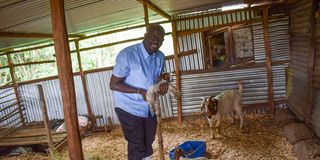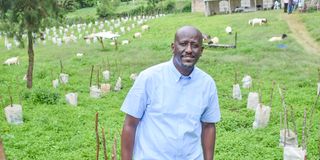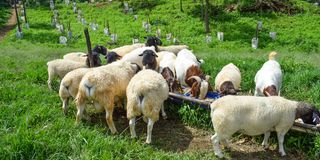Biz Lounge: From a matatu tout to making a killing as a farmer in Njoro

Joe Mwaniki checkIng up on a new born kid on his farm in Njoro.
As we entered Mifugo Falme Farm, we were welcomed by a flock of doper sheep in an open field giving it a serene and pastoral scene with an occasional bleat of the sheep adding to the perfect countryside ambiance.
This farm is owned by Joe Mwaniki, a man who worked as a matatu tout for six years.
Located in Subuku village, Njoro Sub-county Mifugo Falme Limited is a pure example of excelling in agribusiness.
Speaking to Mwaniki, he says he used to practice crop farming but after six years, he decided to shift to goat and sheep farming. This was in 2020.

Joe Mwaniki at his farm in Njoro, Nakuru county.
Starting with just 20 local sheep with a capital of Sh. 80,000, Mwaniki embarked on an ambitious breeding program to help produce superior livestock for sale and meat export to the UAE.
He notes that he had to improve the breeds since they grow faster, increase weight, and build muscles compared to the local breeds.
“Since the local breeds do not build a lot of muscles, I had to import improved breeds which help in increasing the weight hence increasing income when selling the animals and meat for export,” says Mwaniki.
He would later import two rams and eleven ewes from South Africa.

. A T5 ram at Joe Mwaniki's farmer in Njoro.
"To import a quality T5 ram and buck from South Africa requires a budget of Sh. 250,000, while ewes and does cost Sh. 150,000 each to bring to the farm," he says.
After sourcing the animals Mwaniki breeds them to produce the best quality offspring which he then sells for Sh 50,000 at three months. The demands for these animals is so high that they are often booked before birth.
"Before you buy the animal with us. We need to train you on proper management to enable the animals to thrive for you. This allows us to have a relationship with the customers," Mwaniki states.
He has since increased his flock to over 162 animals.
To earn an extra income, Mwaniki charges Sh. 2,000 to those who want to get training in goat and sheep farming.

Joe Mwaniki's sheep and goats share food from a feeding trough in his farm in Njoro.
He notes that the biggest challenge he has faced in the business is losing 14 out of his initial 20 sheep due to an infection that spread from one animal to the rest.
“Having learnt from that incident, I now don’t allow any animal to join the flock unless it's quarantined and proven not to have any diseases.”
From his vast experience in agriculture, Mwaniki believes there is a need to have more veterinary doctors on call to help the farmers from losing their animals.
On the operation cost, Mwaniki notes, that he employs free-range grazing supplemented with silage, lucerne pellets, maize germ, and sunflower some of which is readily available at the farm, hence reducing the cost of maintaining the animals.
Reflecting on his journey, Mwaniki describes starting the farm as ‘the best decision I ever made’. "Coming to the farm is so therapeutic," he says, appreciating the fresh air and the sight of goats and sheep running around.


